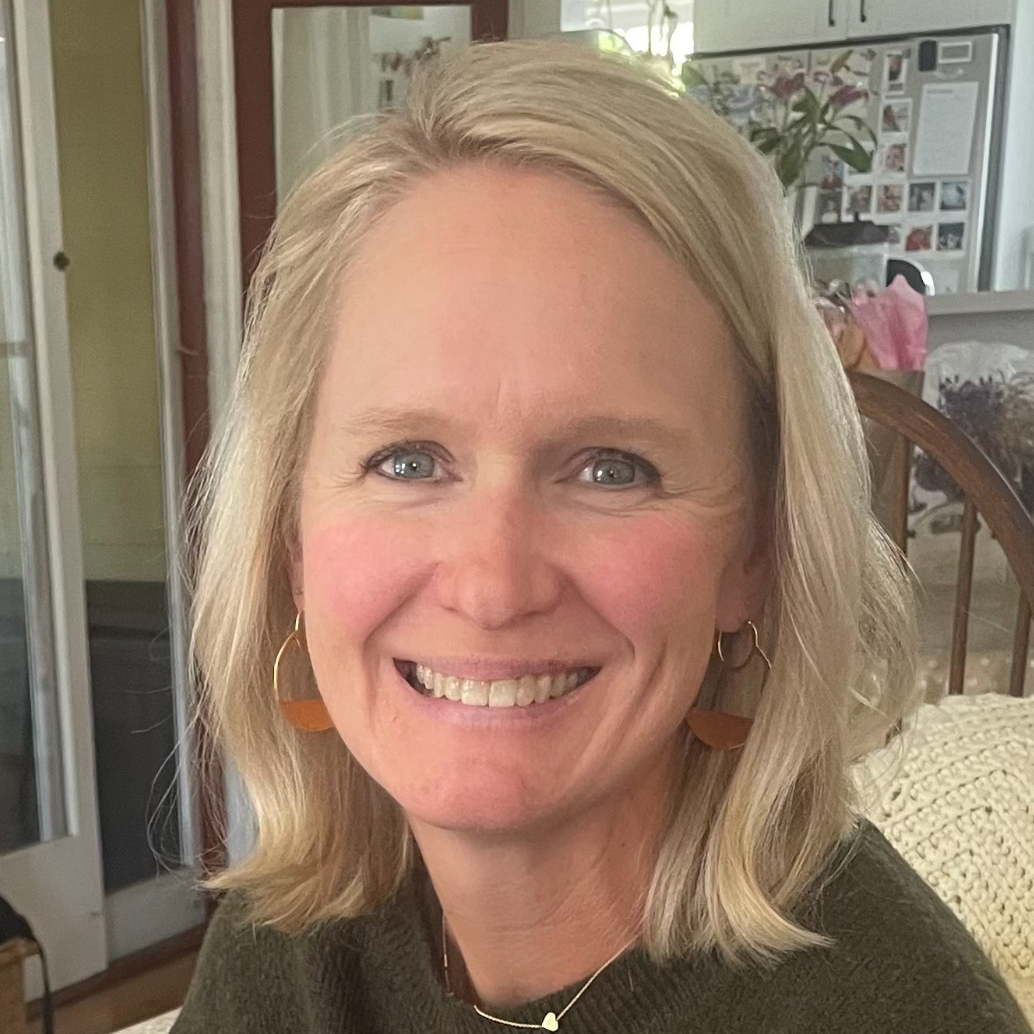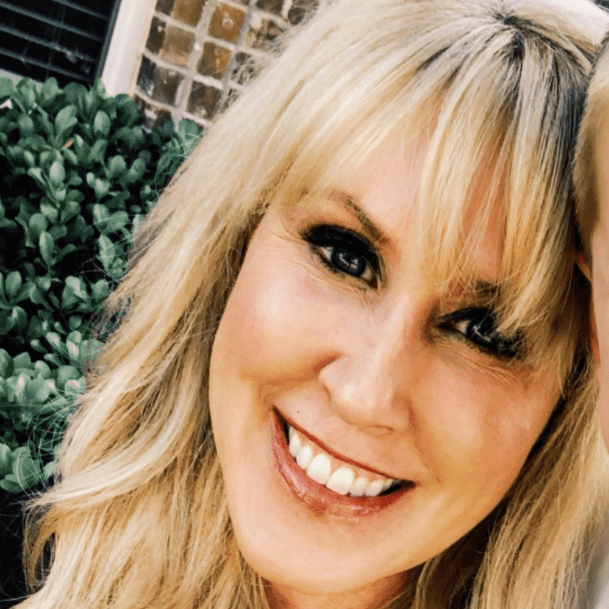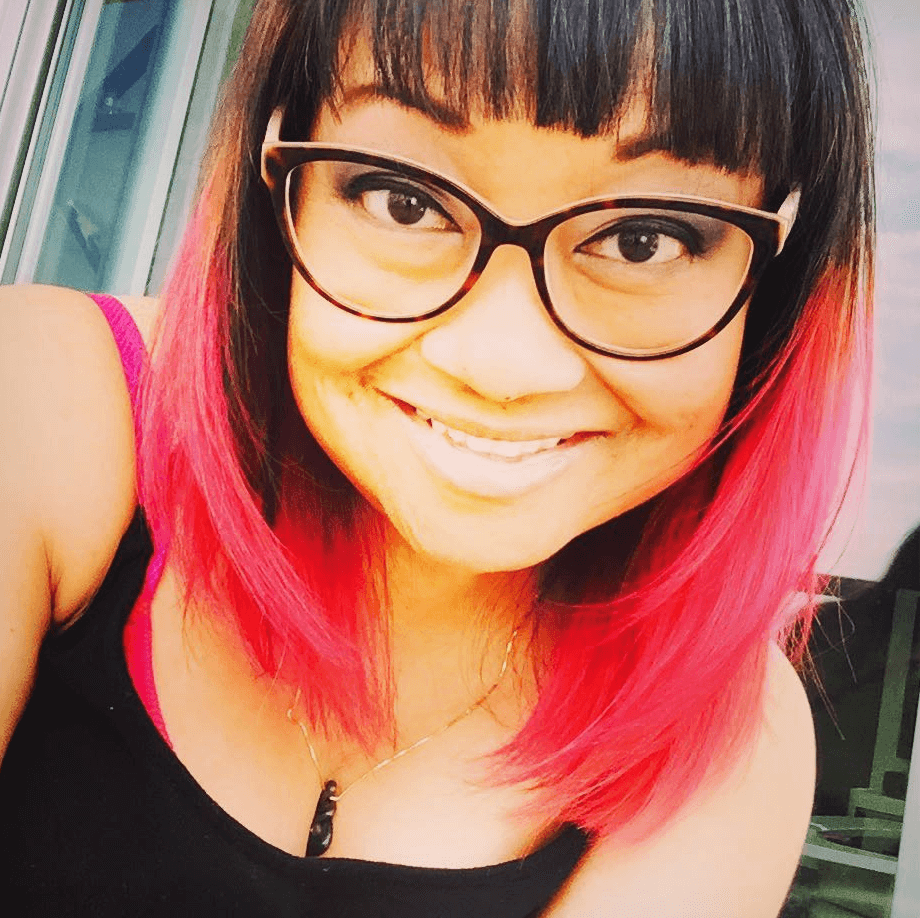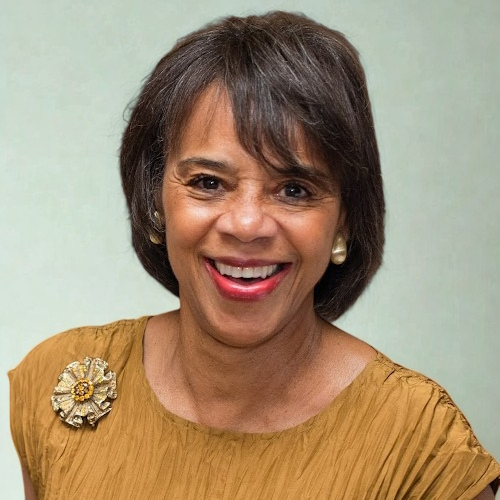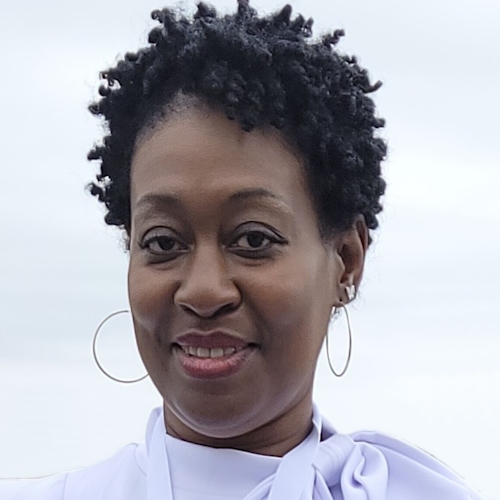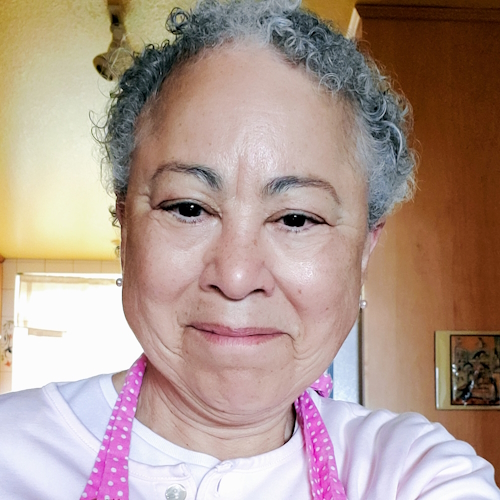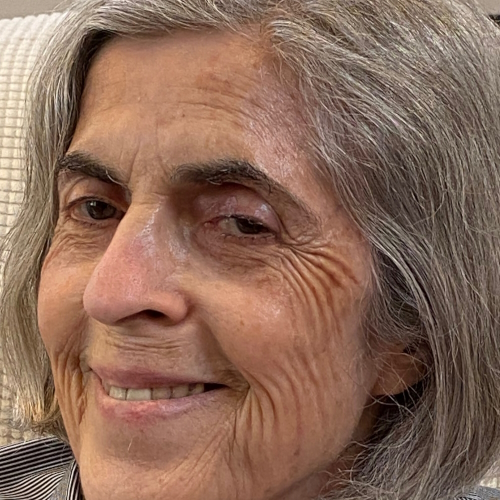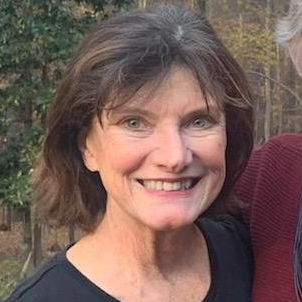Pamela Price: Saving Lives Through Awareness and Action
Pamela Price, Deputy Director of The Balm in Gilead, an organization focused on eliminating healthcare disparities, says she felt fine before she was hit by the news that flipped her world upside down. She was diagnosed with cervical cancer. It’s also not the first time Pamela has had to deal with cancer. She lost her mom and both grandmothers to cancer and has been a care partner to her husband, who’s living with a chronic blood cancer.
Interviewed by: Stephanie Chuang
Edited by: Katrina Villareal
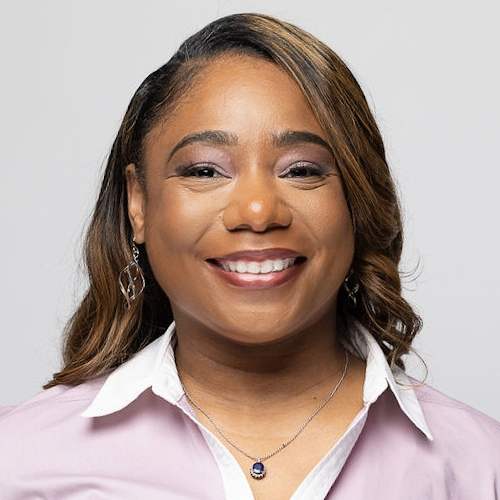
Pamela says it was her and her husband’s doctors who truly advocated for them, changing the trajectory of their care and their lives. Now she works every day to help save other lives through awareness and action. Her mission is to bring the conversation of healthcare and awareness to faith communities across the country.
Multiple myeloma disproportionately impacts Black Americans — 1 in every 5 people diagnosed is Black or African American. That’s why Pamela spent nearly two years working with fellow patients and advocates to identify the top ways to help cut through healthcare disparities for multiple myeloma patients. Pamela and her group were selected to present their findings at the largest gathering of top doctors and researchers in blood disorders and cancers called American Society of Hematology (ASH).
Watch this last episode of our series of three to hear about their top solutions for reducing healthcare disparities and serving as many people as possible who are dealing with the hardships of a cancer diagnosis.

Thank you to Pfizer for supporting our patient education program. The Patient Story retains full editorial control over all content.
This interview has been edited for clarity and length. This is not medical advice. Please consult with your healthcare provider to make informed treatment decisions.
The views and opinions expressed in this interview do not necessarily reflect those of The Patient Story.
- Introduction
- How Cancer Has Impacted My Life
- Experiencing Personal Loss from Cancer
- Importance of Paying Attention to Our Health
- Importance of a Patient’s Lived Experience
- Multiple Myeloma Disproportionately Impacts Black and African Americans
- Reimagining Access to Healthcare & Information
- Importance of Talking About Our Health
It was an amazing primary care physician who wasn’t his regular primary care provider who saw something off in his labs…
To us, she saved his life.
Introduction
I’m the Deputy Director of The Balm in Gilead, where public health and faith intersect.
I’m very extroverted and my husband’s very introverted. He served for over 22 years in the US Army. It was an amazing primary care physician who wasn’t his regular primary care provider who saw something off in his labs. She said, “Hey, you’re young and in shape. I doubt it’s anything, but I’m going to order some additional tests anyway.” To us, she saved his life.
He’s an awesome father. We have twins and an older one who will be graduating from college soon. Outside of the father and the husband that he is, which is why I could be here sharing his story, I’ve never met someone as disciplined, mentally strong, and resilient as he is. I see the physical toll that this takes on him, from the fatigue to the lethargy and the headaches, and I see him every day push through and show up for me and our kids.
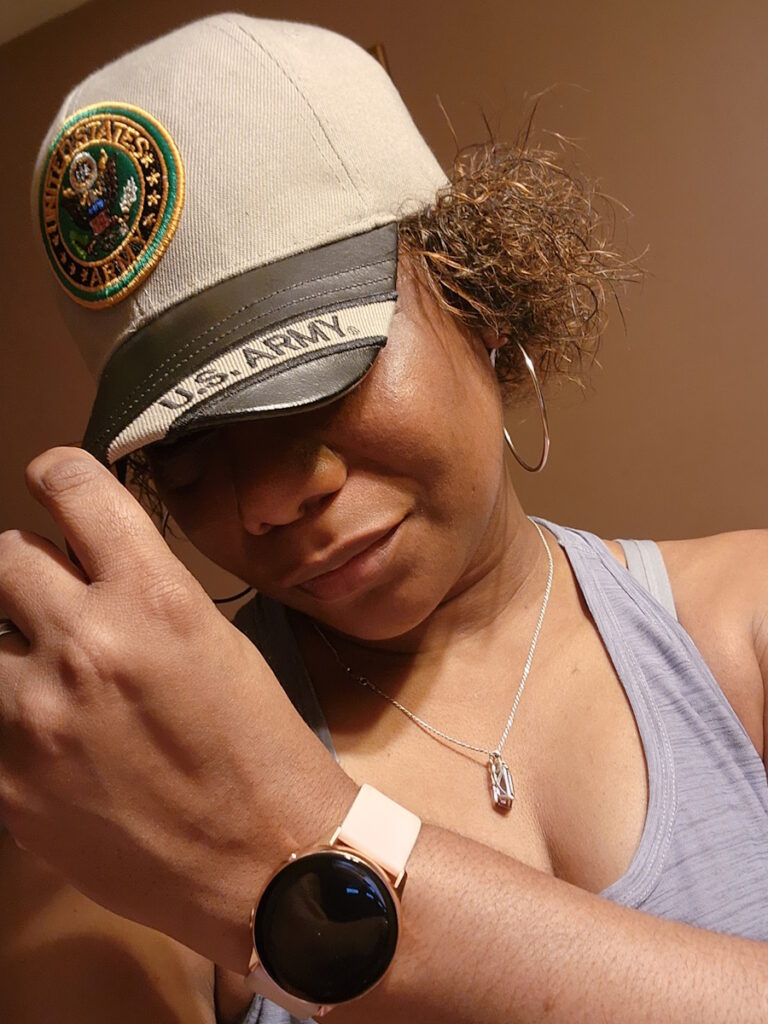
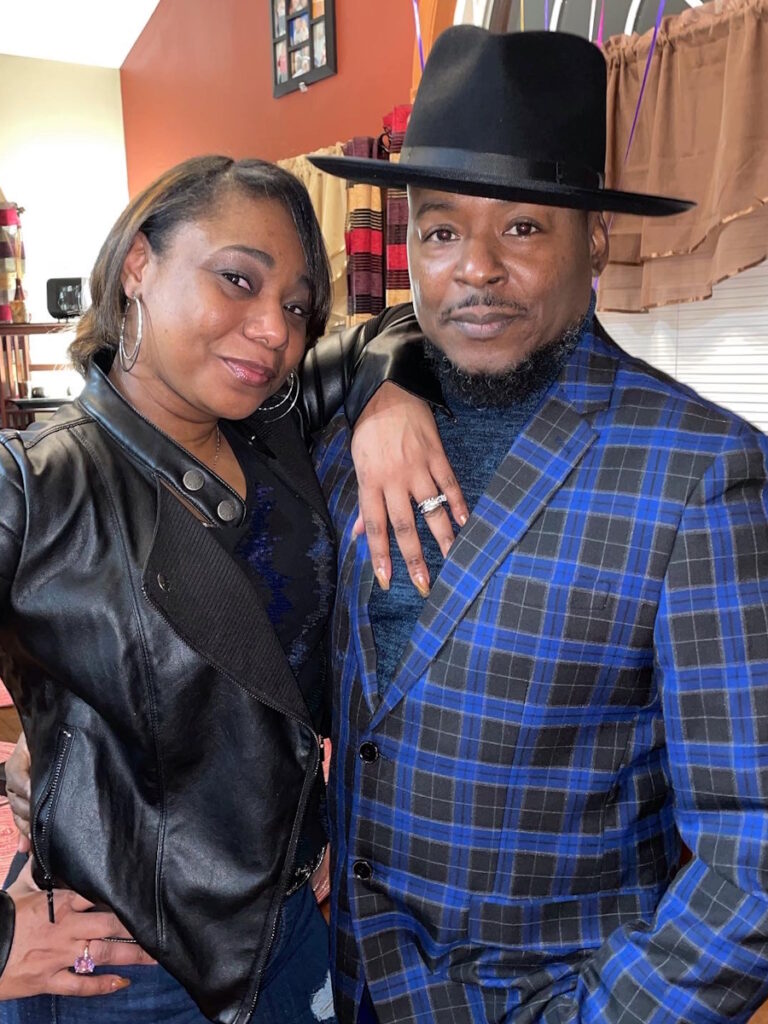
He plans 10,000 things when we go on vacation every year, even though we know that 9 times out of 10, one of those days is going to be a day when he’s not going to physically be able to do it. Those are the things that I love about him so much because it’s a constant reminder of what this journey can be like for a person like him living with it but also for me as a spouse and care partner.
We both were in the military. He served much longer than I did. We met as a group of friends. It was interesting because when I first met him, I thought he was an attractive guy who knew he was attractive and was expecting a certain thing from the ladies, and I was not going to do that. I’m not that girl.
Lo and behold, our paths would cross again. He ran into a good friend of mine who mentioned that we were going to be back at the same duty station. He asked for my number and we connected. We talked on the phone probably daily for months because he was in another duty station until he had a permanent change of station. After about six months, we decided to move in and then six months later, we got engaged before his last deployment to Iraq. We got married once he came back.
I lost my mother unexpectedly in January 2018. I had my bout with cervical cancer the same time…
Then we get my husband’s diagnosis. This was all within January to July 2018.
How Cancer Has Impacted My Life
Cancer has impacted me in different ways. I lost my maternal and paternal grandmothers to breast cancer. My amazing husband was diagnosed with polycythemia vera, but he progressed even after treatment. We have been on his cancer journey since 2018, which was also the year I lost my mom, so that was a very trying year.
He’s a big part of my why. I try to carry the stories of my family, my background, and people from communities where I come from with me.
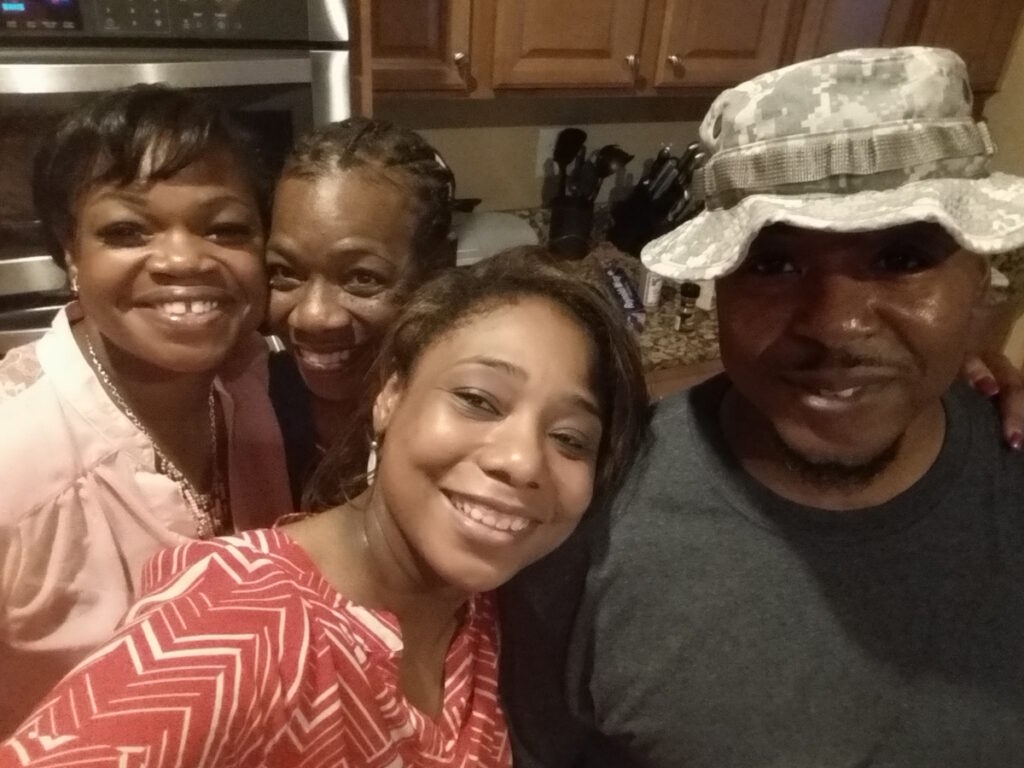
The first thing was that we realized that life is fragile.
Experiencing Personal Loss from Cancer
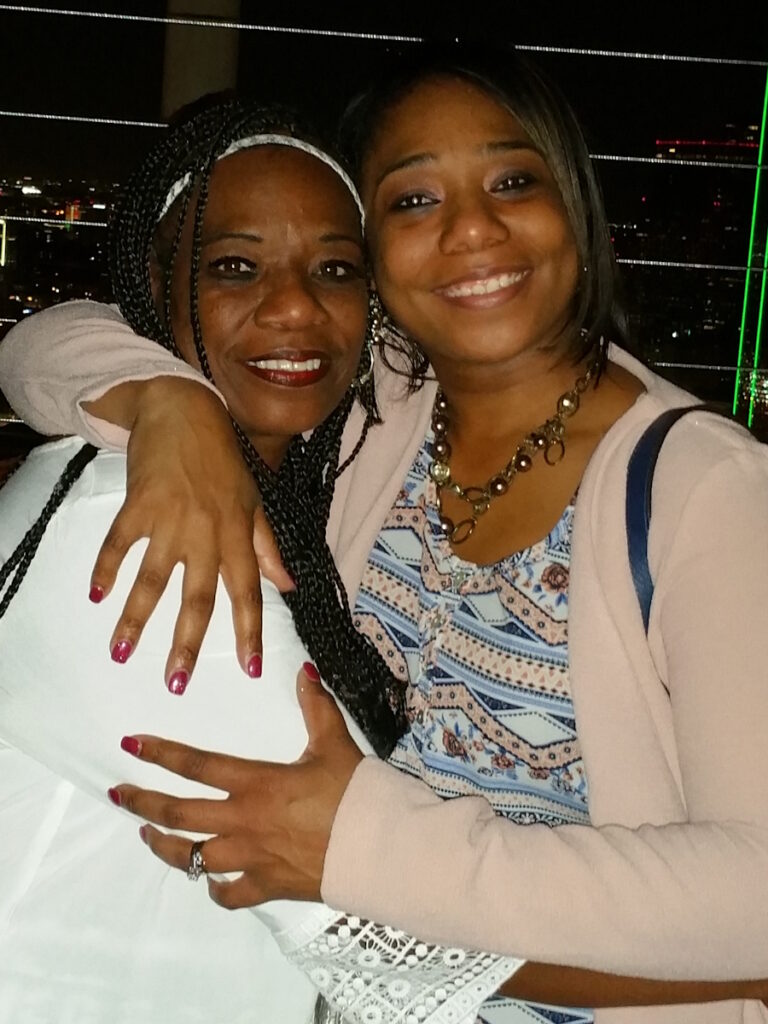
I lost my mother unexpectedly in January 2018. I had my bout with cervical cancer the same time. I had surgery and I was going through radiation, so we were of the mindset that I was going to be fine. Then we get my husband’s diagnosis. This was all within January to July 2018. At that time, our twins were still young. They were about to turn five.
Initially, I thought about the things that we wouldn’t be able to do. I had done the research and realized that we may not have as many years with each other as we had planned. Our initial conversation was about how to master the now. How do we live in a way that will still allow us to do the things that we had planned to do for however long we have? Then we had to sit down and explain to our oldest at the time. We had to wait a couple of years before we explained to the twins and that was difficult, as well.
The first thing was that we realized that life is fragile. We’re not going to have all the time. What do we do? What we came up with was that we were going to maximize every minute. We already had our wills. It’s the day to day. What are we going to do on this anniversary? What are we going to do this weekend? I usually would let it slide that we didn’t have our date night last month or the month before or the month before, because I was somewhere working, but now, how do we reprioritize that?
A small silver lining of his diagnosis is that it allowed us to refocus.
Between losing my mom, having my cancer diagnosis, and now having my husband be on this journey, it helped us focus and prioritize time, how we were going to spend it, and where we were going to channel our energy and focus. A small silver lining of his diagnosis is that it allowed us to refocus that without the diagnosis, we would not have done.
I had no symptoms, which was the crazy part. I went in for a wellness exam and a Pap smear, like I normally would. Then I got a letter that said I had to come in for follow-up testing. When I found out I had cervical cancer, I told my husband, “My reproductive system is literally trying to kill me.” I’ve lived with endometriosis my whole life.
I went to the doctor to find out the course of action, but I wanted to make sure it’s not keeping what I have. We have children, so I don’t need it anymore. I was able to work with my clinician and my oncologist to get a good form of care. Luckily, we caught it early. I had to have some radiation because of the issues with the endometriosis and I had cervical tissue in places it shouldn’t have been, but I was able to come through it well. I lost my hair, but it worked out well.
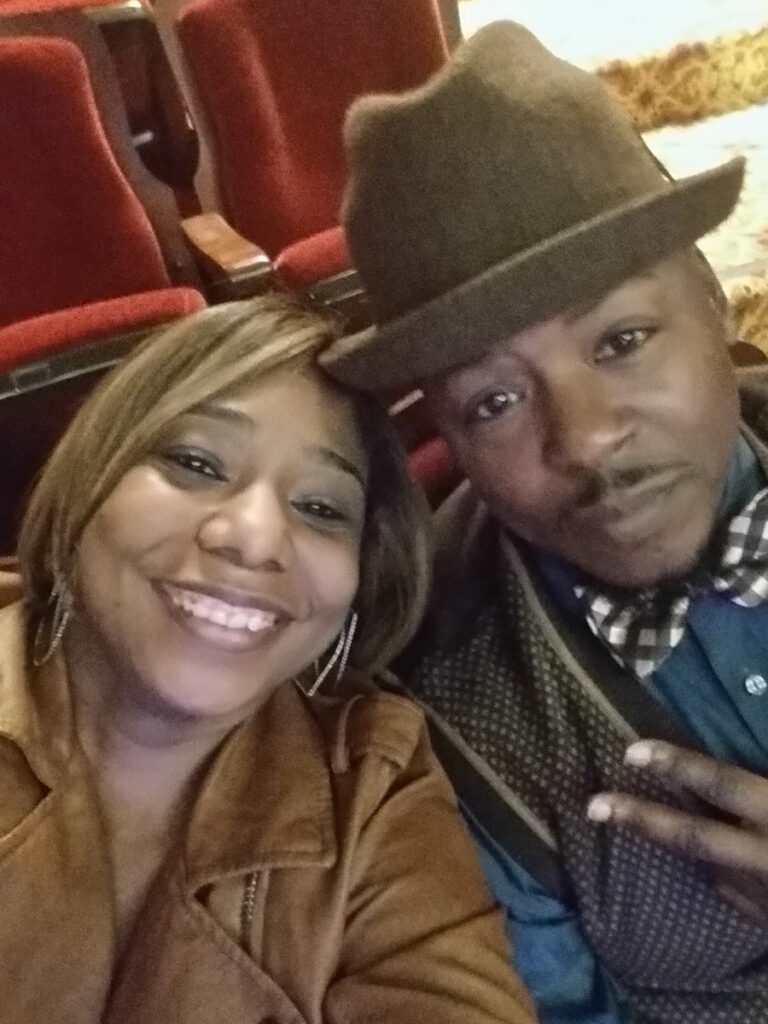
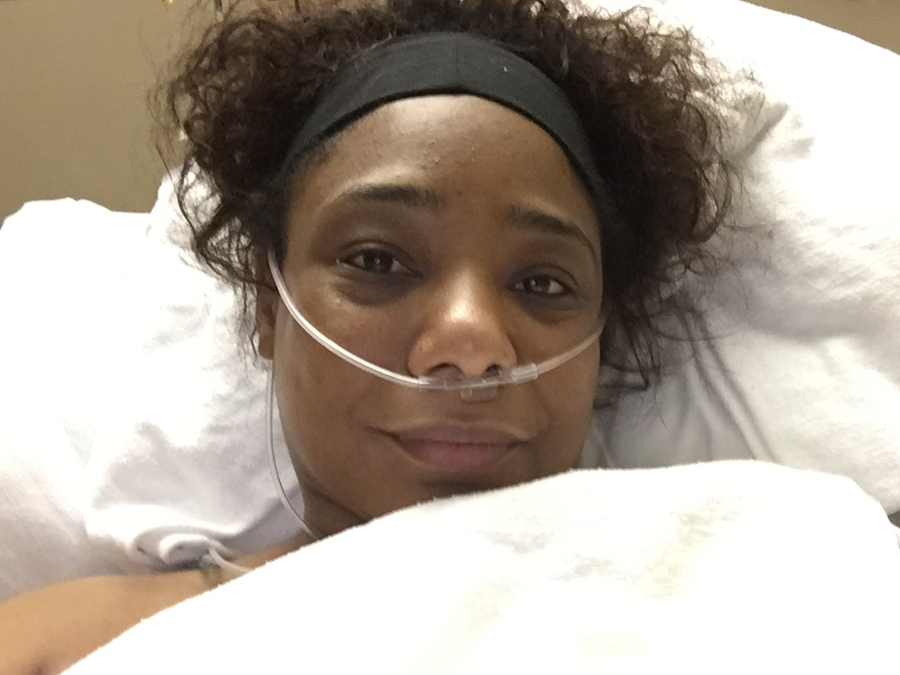
I had no symptoms whatsoever and I almost canceled that appointment because I had lost my mom. I said I’ll reschedule. Something in me said, “You already have a schedule. You know that with the VA, it’s hard to get an appointment. Keep the appointment.”
Luckily, I kept it and I got referred to a good OB-GYN and a good oncologist. We found a plan that worked for me. They didn’t try to convince me to keep things. I told them they could take it all. I welcomed menopause early. At this point, I didn’t want to risk that something else along this reproductive track would decide it doesn’t like me anymore. We’ve been on this with my husband since that same year. 2018 was a doozy.
You will always be your best advocate because you’re the one who knows your body the best.
Importance of Paying Attention to Our Health
One of the first things that I tell them is not to rely on the information given to them. A lot of times, you have to research and find that information yourself.
You will always be your best advocate because you’re the one who knows your body the best. You may pick up on telltale things that externally aren’t revealed. Maybe they won’t even show up on a lab, like they did with my husband.
Recognize that when you walk into a provider’s office, you have the most important voice in that appointment. I know we don’t always see it that way. We trust and rely on our providers and we do need them, but we also should make sure to keep that power dynamic equitable. Don’t relinquish your voice. Those are the key things that I constantly tell my family, friends, and the people I meet through the work that I do. I tell my daughter now that she’s having her doctor’s appointments without me.
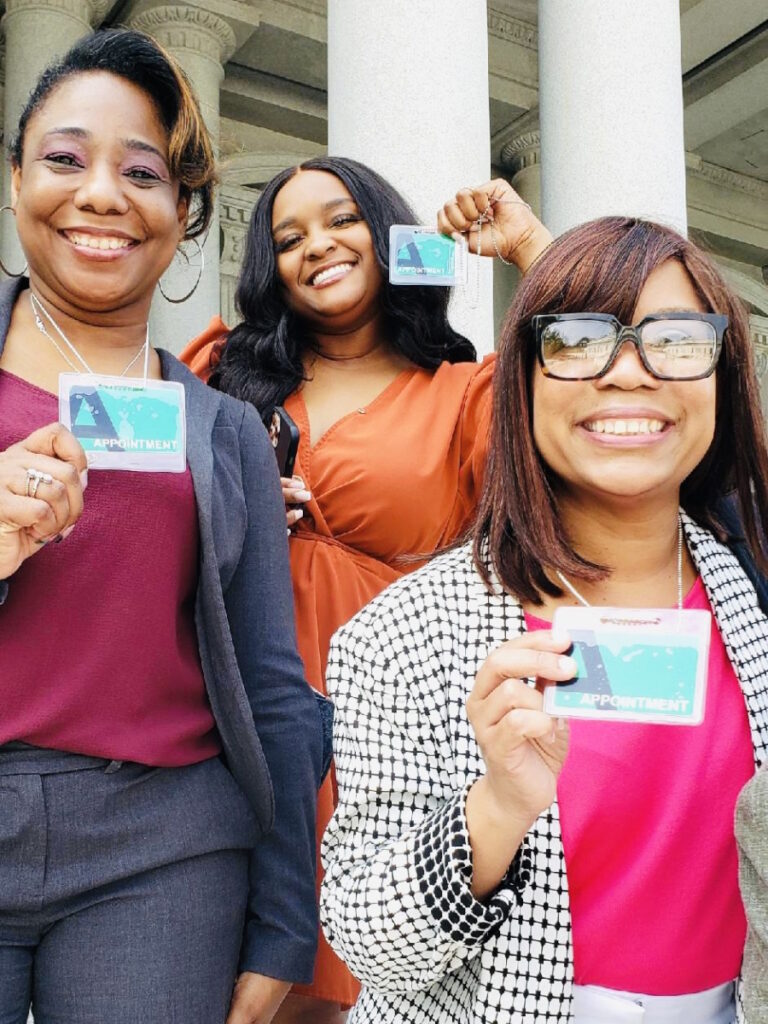
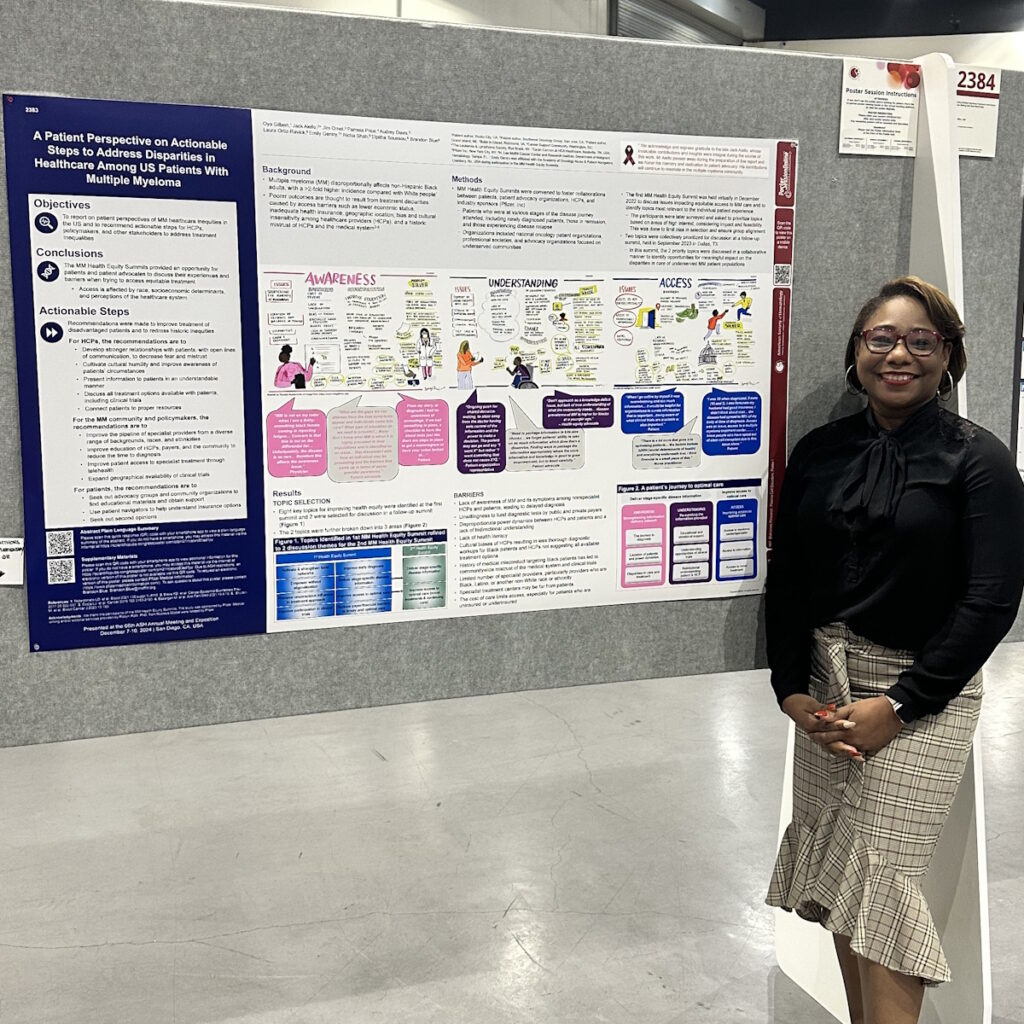
Importance of a Patient’s Lived Experience
This research was patient-focused. I know we use that term a lot, but this was one of the rare opportunities that I’ve been able to participate in a committee where nothing was decided without the patient. Even in this abstract, our lead author is a patient, so it amplified the power of the lived experience of the patient.
There’s no amount of education that we can have academically or even in work that I do as an advocate that can rise to the level that lived experience provides. This project centered on that and we could see the fruit of what something could look like in a scientific conference like ASH that is, the patient on a poster in a paper. It’s useful not just for patients. This is something providers, clinicians, and other community organizations can use.
There’s no amount of education that we can have academically or even in work that I do as an advocate that can rise to the level that lived experience provides.
Multiple Myeloma Disproportionately Impacts Black and African Americans
The biggest problem was cost. That’s something that, even we as a group, we’re not necessarily equipped with to deal with insurers and payers. Eventually, the right stakeholders will have to get together to figure out how to address that because that’s a significant issue.
Another one is access. Even if we can educate the community about what multiple myeloma is, what MGUS (monoclonal gammopathy of undetermined significance) is, and all these other things, it’s all for naught if we don’t have access. By access, I mean rethinking and reimagining where healthcare is delivered, how healthcare is delivered, and making sure that access is no longer a barrier like it is today.
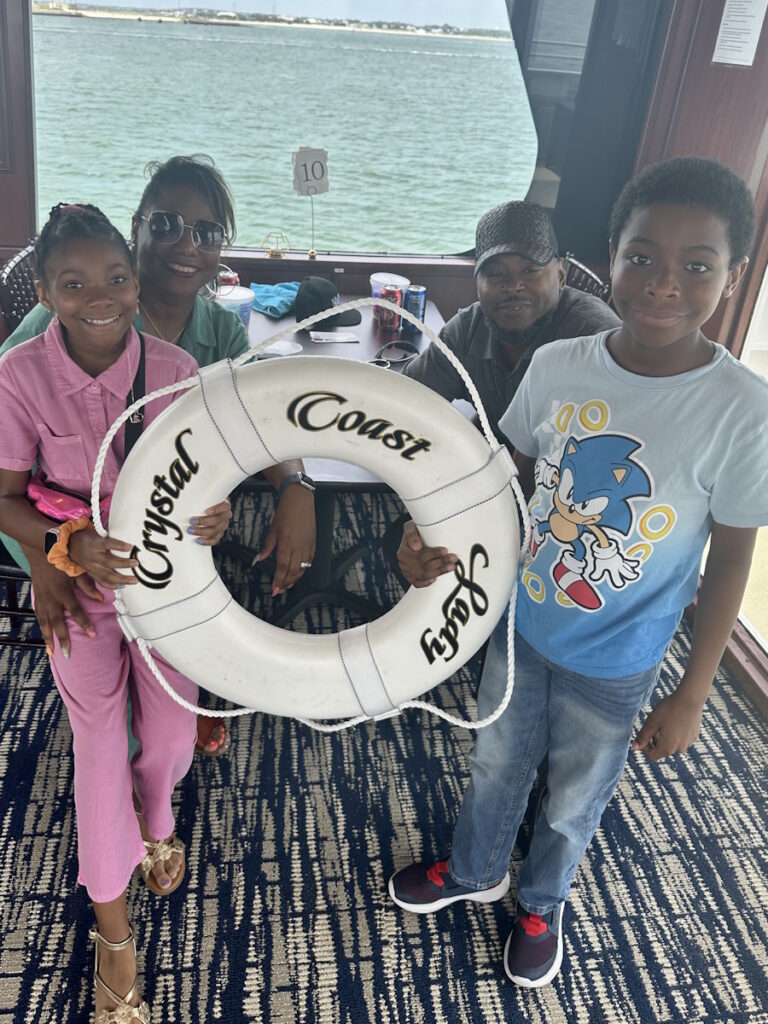
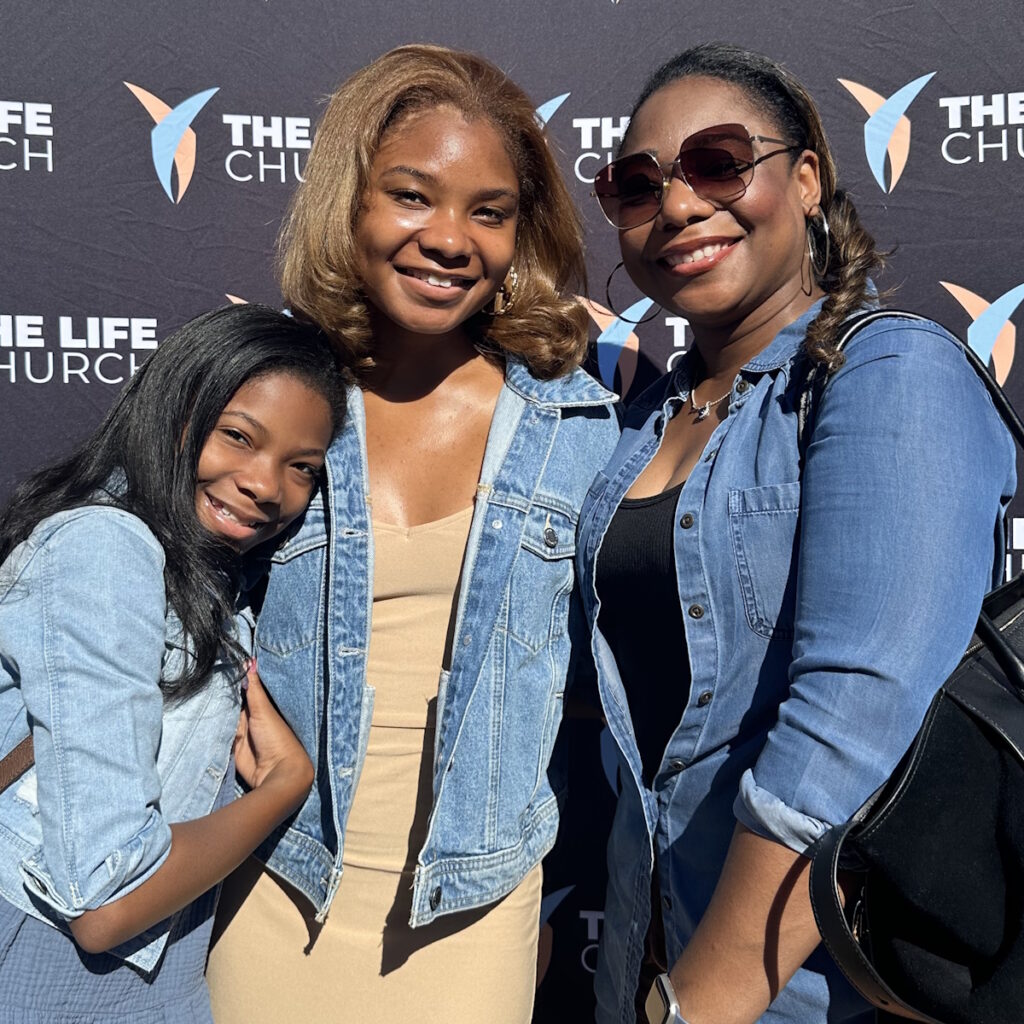
Reimagining Access to Healthcare & Information
The healthcare system, as it stands today, is very transactional. For better or for worse, that’s the system that we currently have. By reimagining it, how can we put something, let’s say, in a church that’s a trusted place?
Within the landscape of multiple myeloma, clinical trials are key and pivotal. We have so many new therapies coming to market, but we don’t have the representation that we need. Can we invest something in a church that has a community center and come out to them on a Saturday, like we typically do at The Balm in Gilead, and do some type of awareness event with them?
Even if we can educate the community about what multiple myeloma is… it’s all for naught if we don’t have access.
Then take it a step further. How can I work and train a couple of people in the church on the basics of a clinical trial or what cell therapy looks like for a multiple myeloma patient? How can I work with the church to establish a multiple myeloma peer support group?
For the African American community, our church has historically been our anchor. From the time we arrived on this continent, our faith has been an anchor for us and it drives our behavior. One of the biggest scriptures we use in our work is that faith without works is dead. We don’t ask people to abdicate their faith, whatever form it comes in. We don’t ask you to abdicate praying, but we do ask you to pair that with action. Make yourself a more informed individual, make your communities more informed, and break down some of the traditional silos of how and where we think this type of information and engagement can take place.
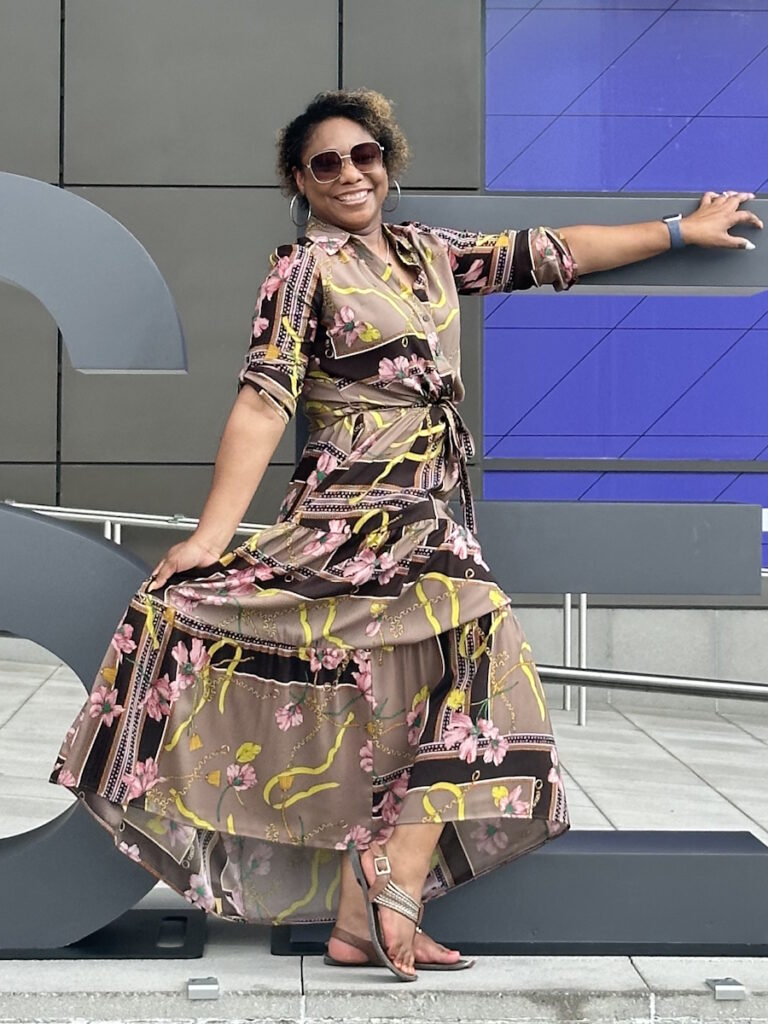
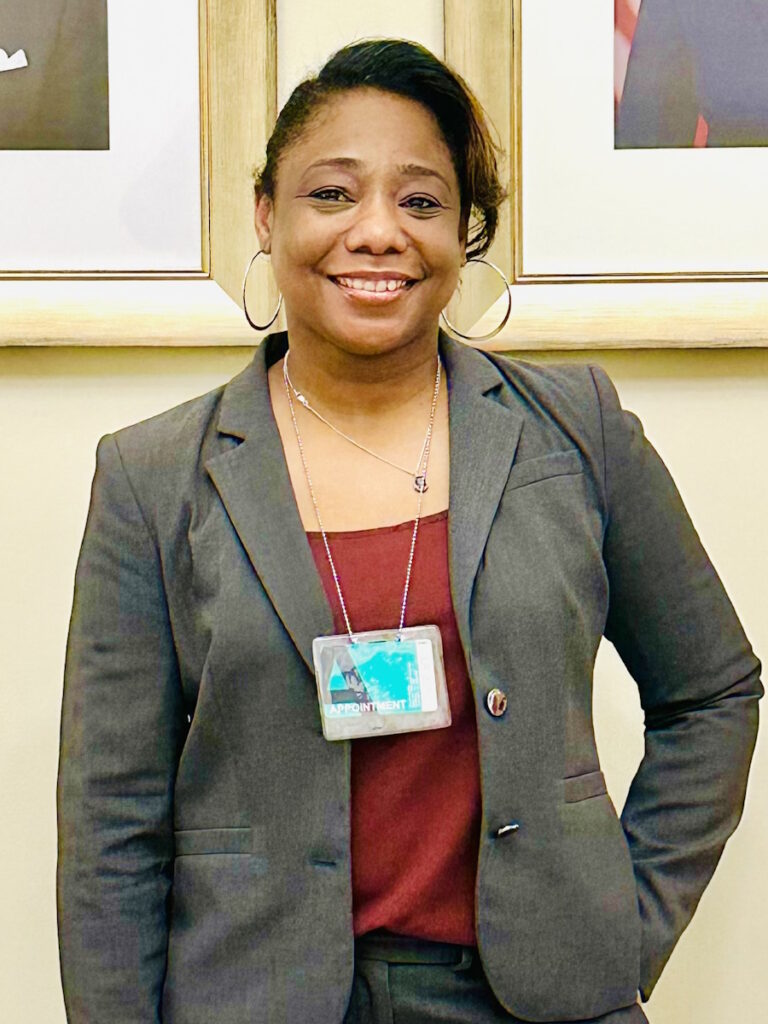
Importance of Talking About Our Health
Something that I’ve said to churches, faith leaders, and pastors is that we know and we teach in terms of the God that we serve that we are nothing but spiritual beings having this earthly encounter. But along this earthly encounter, it is this fleshly body that we must have this encounter through, so we have to make sure that we’re doing our part, whether it’s prevention or treatment.
God will do His part and do His work, but we have to make sure that we identify our work to make sure that we’re doing what we can to protect this vessel that we’ve been given, so that we’re not sending souls to see our Maker prematurely.
Sadly, we see it play out and that’s in the disproportionate rate of deaths. It’s in the disproportionate rates of individuals being diagnosed too late or inaccurately. How are we going to shift that paradigm? We know the social determinants of health, and that’s been something that’s been coined and raised for decades, but still, here we are and African Americans are bearing the burden for multiple diseases and conditions.
African Americans are bearing the burden for multiple diseases and conditions.
Can we afford as a community, as a people, and even collectively as a country, to not pause and take the time to get it right? Look at some of the solutions that this committee, led by patients and take some of those things to heart. Make the tough decisions. Be first, be bold, be innovative, be forward-thinking, and get outside of the box to not do something just because that’s the way we’ve always done it. The risk is that we will continue to lose lives that we don’t have to lose.
I know it seems ridiculous, but go get your wellness exams. We let so many things pass and get worse, and then we decide to go and it’s through the route of an emergency room. I know many of us have heard of someone who goes into the ER, then the next thing you know, they’ve got a triple bypass and it’s because of high blood pressure that has been running rampant for who knows how long.
How do we start to nurture this next generation to be able to not only move forward with the advocacy but move forward with the innovation that we’ve heard and learned about at ASH? That would be my thing. My passion is young people because they are going to be the future. I figured that if we can take care of you better, you will take care of us.


Special thanks again to Pfizer for supporting our patient education program. The Patient Story retains full editorial control over all content.
Hip-Hop, Hope, and Health: Oya Gilbert’s Multiple Myeloma Story
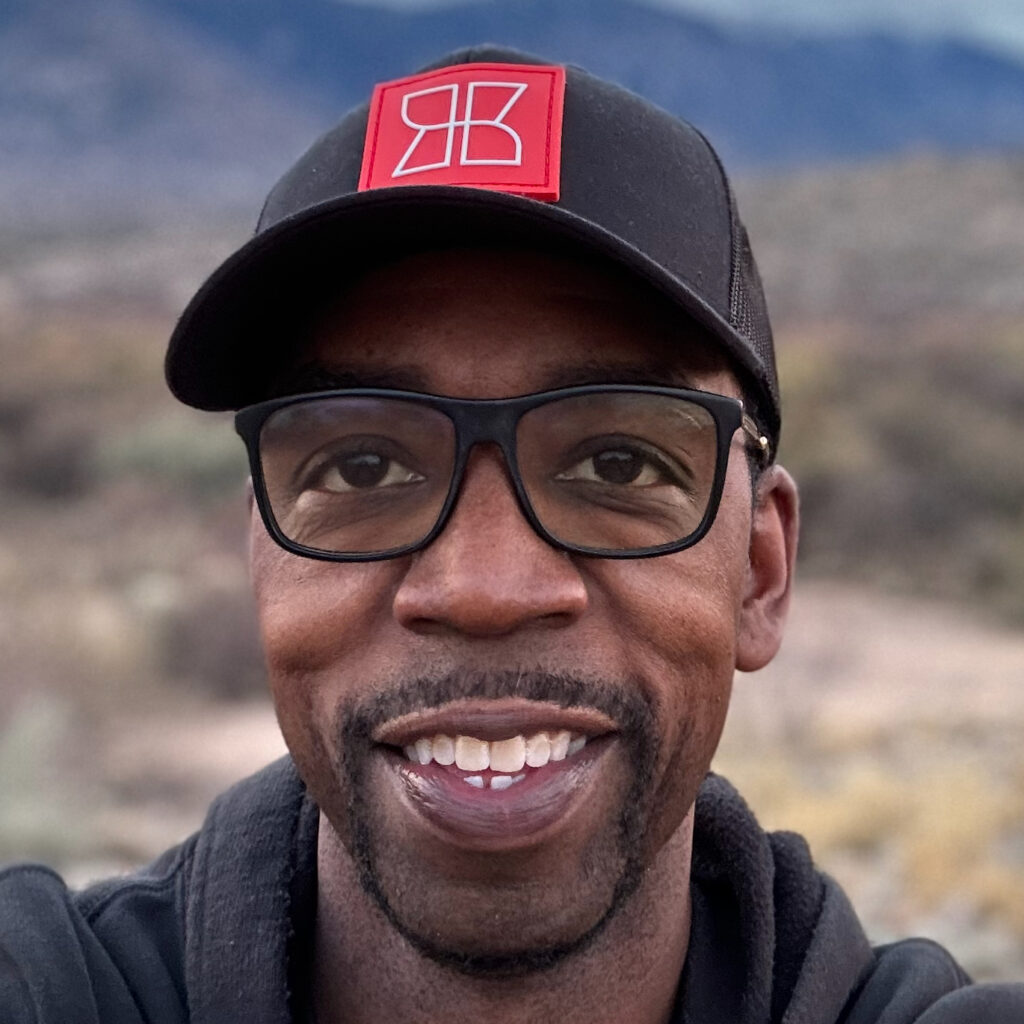
Oya Gilbert had always been full of energy. A father, a hip-hop lover, and a man who rarely got sick. But in 2015, his body started sending him signals he couldn’t ignore. But for two years, doctors dismissed his symptoms as anxiety. Watch Oya’s story from misdiagnosis to myeloma advocacy.
Dr. Brandon Blue on Improving Myeloma Care for Black Patients
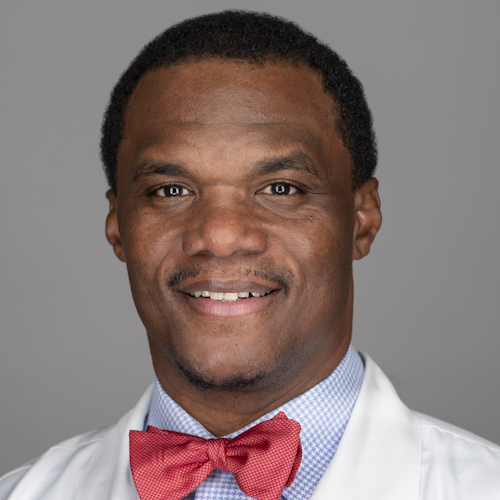
Brandon Blue knew at a young age that he wanted to help people. Decades later, he’s done that and so much more, changing and saving the lives of people who’ve been diagnosed with cancer.
Learn key tips on how people can make a difference for themselves and their health, and what can help save lives.
First-Line Treatment Stories
Michelle C., Multiple Myeloma
Symptoms: Back pain, sinus infections, painful and itchy scabs, stomach pains, weight loss
Treatments: First-line treatment, stem cell therapy
Melissa V., Multiple Myeloma, Stage 3
Symptom: Frequent infections
Treatments: IVF treatment & chemotherapy (RVD) for 7 rounds
Jude A., Multiple Myeloma, Stage 3
Symptoms: Pain in back, hips and ribs; difficulty walking
Treatments: Bilateral femoral osteotomy, reversal due to infection; chemotherapy
Relapsed/Refractory Treatment
Dr. Yvonne D., Relapsed/Refractory Multiple Myeloma
Symptoms: Severe hip pain, trouble walking due to a broken pelvis, extreme fatigue, bone pains
Treatments: Chemotherapy, stem cell transplant, radiation therapy, surgeries, CAR T-cell therapy
Michele J., Relapsed/Refractory Multiple Myeloma
Symptoms: Fatigue, anemia, persistent lower back pain, sharp leg pain during movement
Treatments: Surgery, chemotherapy, stem cell transplant
Theresa T., Relapsed/Refractory Multiple Myeloma, IgG kappa Light Chain
Symptom: Extreme pain in right hip
Treatments: Chemotherapy, CAR T-cell therapy, stem cell transplant, radiation
Laura E., Multiple Myeloma, IgG kappa
Symptom: Increasing back pain
Treatments: Chemotherapy, stem cell transplant, bispecific antibodies
Donna K., Refractory Multiple Myeloma
Symptom: None; found through blood tests
Treatments: Total Therapy Four, carfilzomib + pomalidomide, daratumumab + lenalidomide, CAR T-cell therapy, selinexor-carfilzomib
